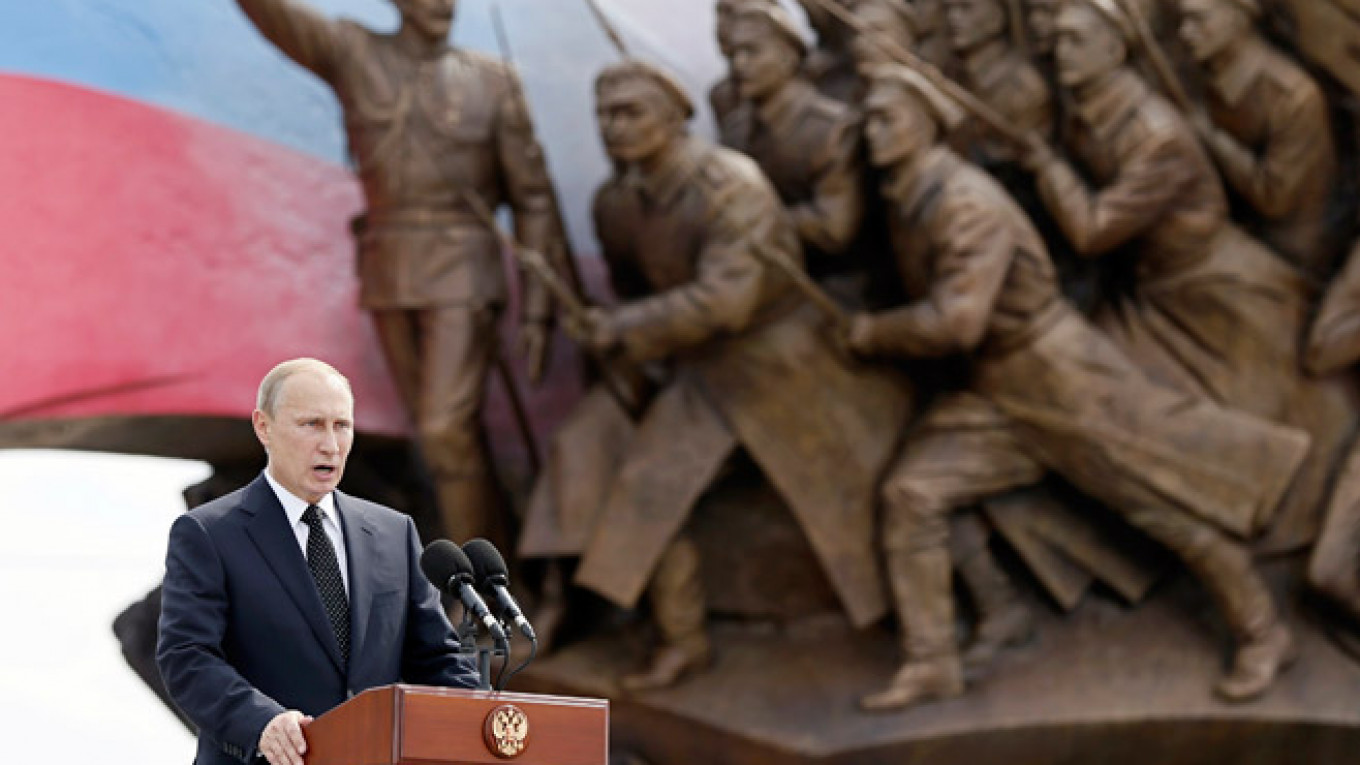On Friday, Aug. 1, President Vladimir Putin took time off from making history, to reflect on history.
At a ceremony marking, to the day, the centenary of Germany's declaration of war on Russia, Putin spoke at the opening of a new World War I monument. In his statements, Putin appeared to be more and more explicitly embracing a deeply historical view of Russia's statehood — or what his critics would call an imperialist mindset.
Even the tone of the speech reflected this historical, almost imperialist outlook. Instead of the more inclusive "Rossiisky" adjective, which pertains to the Russian state with its multiethnic population, Putin made more frequent use of the more Slavic "Russky" to refer to the military glories of World War I.
But what stood out the most was Putin's explanation of Russia's part in World War I. Putin complained that in Soviet times World War I "had been written out of history as an imperialist war." Far from being an imperialist war, he argued, Russia had acted justly to "defend its Slavic brothers" and fulfill its commitments to its allies. This eerily echoes Putin's own justifications for annexing Crimea.
He even argued that Russia was on the verge of winning, thanks to the 1916 Brusilov Offensive, but "victory was stolen from the country by those who sowed dissension within Russia, who longed for power, and who betrayed the national interest." Putin, of course, was referring to the Bolsheviks, though by failing to mention them by name he was in effect turning the tables and writing them out of history.
From remarks earlier this year, it is clear that Putin also blames the Bolsheviks for splitting up Russia's empire. On April 16, during a televised phone-in, he condemned the Bolsheviks for giving Russian territory to Ukraine. He said "Kharkiv, Luhansk, Donetsk and Odessa were not part of Ukraine in tsarist times; they were transferred in 1920. Why? God only knows."
But the issue of commemorating World War I had been on Putin's mind long before the current crisis in Ukraine. In a Federation Council meeting on June 2012, Putin complained that "it was called an imperialist war in Soviet times." He added that "there is no difference between the first and second world wars" because in both cases "people gave their lives for their country and should not be forgotten."
He suggested that Soviet leaders deliberately chose to ignore the war because they had capitulated to the Germans in 1918, an act that he called "national betrayal." Putin's anti-Bolshevik analysis, of course, drew a strong protest from Communist Party leader Gennady Zyuganov, who still defends the Leninist legacy.
In his December 2012 state-of-the-nation address, Putin came back to the theme, lamenting that there was not a single World War I memorial in the country and arguing that it is important "to remember that Russia did not start in 1917 or even 1991." The State Duma responded by promptly declaring Aug. 1 a day to commemorate the heroes of World War I and authorizing the construction of a monument, to be paid for mainly by voluntary donations.
In 2005, Putin famously referred to the Soviet collapse as "the greatest catastrophe of the 20th century." But it seems that he considers the collapse of the tsarist empire to have been equally catastrophic.
By his actions in Ukraine, and by his words over the past several years, it is clear that Putin is motivated not just by a desire to stay in power but also by a desire to fulfill his historic duties as a leader of the Russian state. This is, to put it mildly, strikingly different from the way that World War I is being remembered in the rest of Europe, where it is portrayed as a tragedy testifying to the futility of war.
Peter Rutland is a professor of government at Wesleyan University in Middletown, Connecticut.
A Message from The Moscow Times:
Dear readers,
We are facing unprecedented challenges. Russia's Prosecutor General's Office has designated The Moscow Times as an "undesirable" organization, criminalizing our work and putting our staff at risk of prosecution. This follows our earlier unjust labeling as a "foreign agent."
These actions are direct attempts to silence independent journalism in Russia. The authorities claim our work "discredits the decisions of the Russian leadership." We see things differently: we strive to provide accurate, unbiased reporting on Russia.
We, the journalists of The Moscow Times, refuse to be silenced. But to continue our work, we need your help.
Your support, no matter how small, makes a world of difference. If you can, please support us monthly starting from just $2. It's quick to set up, and every contribution makes a significant impact.
By supporting The Moscow Times, you're defending open, independent journalism in the face of repression. Thank you for standing with us.
Remind me later.






